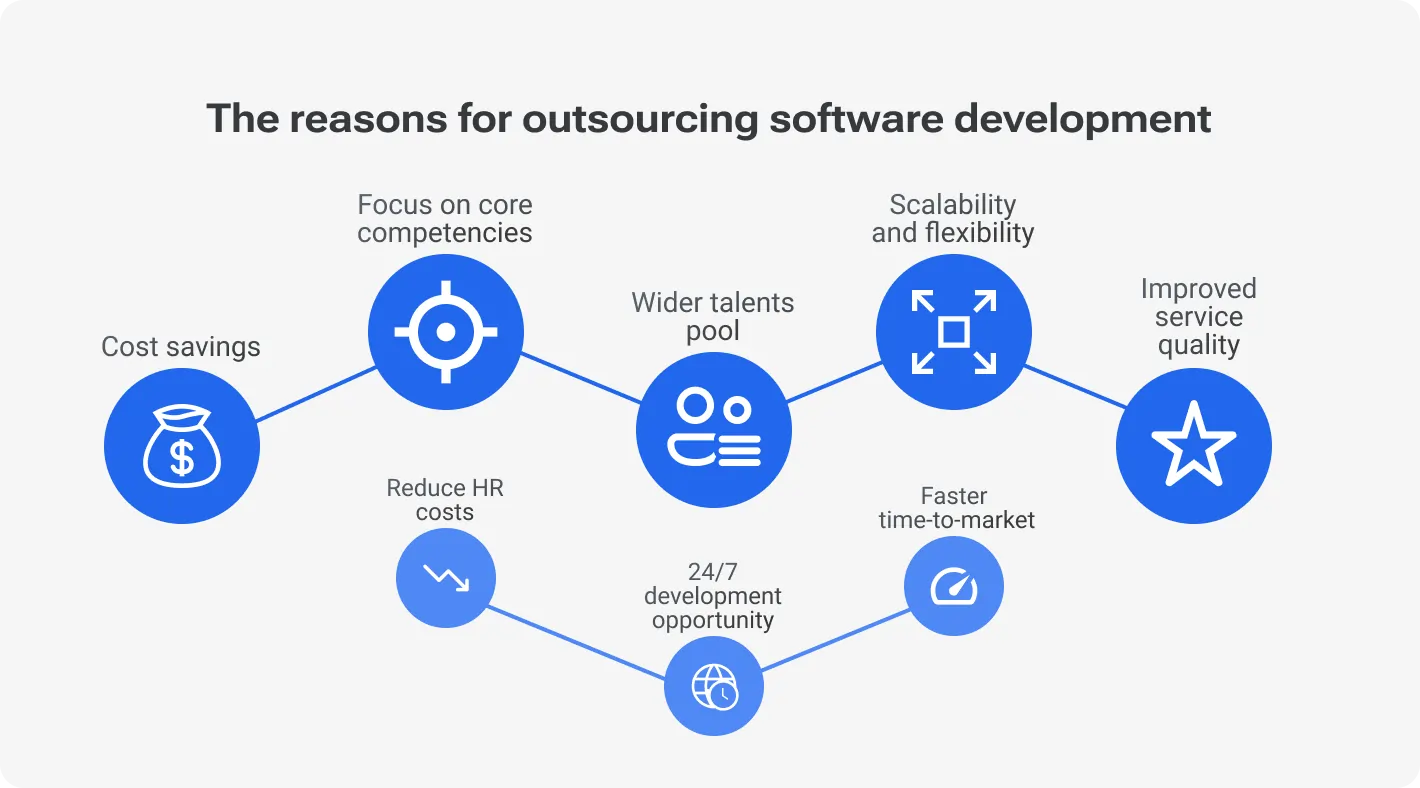Every year, almost one in four software engineers quit their jobs. When that happens, projects slow down, knowledge gets lost, and teams are forced to start over again and again.
It’s hard to build great products when your team is always changing. Deadlines slip, releases get delayed, and the people who stay lose track of the bigger picture.
The best companies don’t wait for things to be perfect, they keep moving forward, and they do it differently.
Outsourcing software development isn’t about cutting costs anymore.
It’s about keeping projects moving when everything else feels uncertain.
It’s about getting access to top talent without waiting months to hire.
And it’s about letting your team focus on the core product while experts handle the rest.
When done well, outsourcing gives you an edge – it’s a smart strategy, not a shortcut.
In this article, we’ll explain why outsourcing software development still matters in 2026 and how leading companies use it to grow faster and stay strong.
Flexible trials for staff augmentation and expertise transitioning services
5 benefits of outsourcing software development in 2026
Outsourcing has evolved into a strategic lever for companies aiming to improve speed, efficiency, and access to specialized skills, without expanding internal headcount. Here’s how it delivers value across the board.
1. Access a global pool of specialized talent
Global talent availability
One of the biggest benefits of outsourcing software development is that it eliminates geographic limitations, giving companies access to a broader, more diverse talent pool. According to Deloitte, 70% of companies cite access to skilled talent as a top reason for outsourcing.
Domain-specific expertise
Instead of building niche capabilities in-house, outsourcing allows you to work with teams that already have experience in specific domains. For example, over 58% of companies outsource to gain access to specialized technology expertise.
Innovative thinking
External partners bring diverse experience and a fresh perspective to your product, often uncovering opportunities or improvements that internal teams may overlook.
2. Speed up product delivery with 24/7 development
Faster time to market
Companies that outsource report development cycle times are reduced by up to 30–50%, thanks to ready-to-go teams and mature delivery pipelines.
Continuous development
With distributed teams across time zones, companies can take advantage of 24/7 development. This "follow-the-sun" model can cut time-to-market by up to 25%, especially for teams operating across the U.S., Europe, and Asia.
Operational excellence
When you outsource software development, you gain access to vendors with mature workflows across development, QA, and release, reducing bottlenecks and ensuring consistent delivery.
3. Keep your core team focused on strategic work
Optimized internal resource allocation
A Harvard Business Review study found that companies lose up to 20% of productivity when internal teams are pulled into non-core tasks. Among the advantages of outsourcing software development is the ability to sharpen your focus on strategic initiatives like innovation, growth, and customer experience, while external teams handle the rest.
Reduced managerial overhead
Outsourcing partners take ownership of delivery, team performance, and execution, allowing your leadership team to stay focused on growth, not micromanagement.
4. Scale fast without long-term hiring commitments
On-demand scaling
One of the key reasons to outsource software development is flexibility – it allows you to scale resources up or down as business needs evolve without long-term commitments.
Resource elasticity
You gain the ability to quickly adapt to market shifts or product roadmap changes by adjusting resources without operational disruption.
5. Reduce compliance & delivery risks
Mitigation of delivery risks
Reputable outsourcing firms adhere to international standards (ISO, GDPR, HIPAA) and often have more advanced security controls than internal teams. In fact, 76% of enterprises say outsourcing partners help improve their compliance posture.
Stronger security posture
Mature vendors follow best practices in data security and compliance, offering safeguards that may exceed those of internal teams, particularly in regulated industries.
When to outsource software development. 3 strategic scenarios
Development outsourcing isn’t a one-size-fits-all solution. If you see an outsourcing company position itself as a jack-of-all-trades, it should be a telltale sign that you need to look for a different partner.
Outsourcing software development is most effective when applied strategically. Particularly, you need to consider scenarios where speed, scalability, or specialized expertise is critical.
Scenario #1. Need for speed in MVP launches for startups
For many startups, the reasons to outsource software development start with speed: launching MVPs faster and gaining traction before the competition even catches up. IT software development outsourcing helps you tap into external expertise without the delays in building a full-time in-house team.
Add-on:
When time is of the essence, use software development outsourcing to build and iterate your MVP quickly. Focus on core functionalities in-house. Outsource supplementary components to speed up the development cycle.
Scenario #2. Scaling during growth spikes and high turnover periods
Quick growth often demands scaling software development teams quickly. Outsourcing projects and outsourcing staff offers the flexibility to ramp up resources during peak periods. You also get such a chance without the long-term commitment of hiring full-time staff.
One of the strongest benefits of outsourcing software development is the ability to replace lost capacity quickly without compromising delivery timelines. Imagine you have lost a couple of key software engineers at the most sensitive moment of the development cycle. You can quickly triage the wound by hiring offshore developers.
Add-on:
Use outsourced teams to handle surge capacity during growth spikes. Such an approach allows you to keep the development cycle running without compromising speed and quality.
Scenario #3. The case of integrating emerging technologies
Without a doubt, new technologies are looming. Think about AI, ML, IoT, and quantum computing. The more these technologies become common, the more the demand for specialized expertise becomes crucial. One of the major benefits of software outsourcing is the ability to adopt emerging technologies like AI and IoT without needing to build internal expertise from scratch.
Add-on:
When venturing into emerging technologies, choose outsourcing partners with proven expertise. Don’t just believe hypothetical scenarios and words. Check case studies to understand whether a potential partner has real experience of working with projects related to AI, ML, IoT, RPA, and alike.
The scenarios above illustrate exactly why outsource software development decisions can be mission-critical, especially for companies navigating growth, innovation, and tight deadlines. Remember, the model can help you in many more potential scenarios. However, there is a high likelihood that the aforementioned cases are the ones startups will face.
10 questions to ask your software development outsourcing vendor
In-house vs. Outsourced software development. How to choose?
Choosing either outsourcing or in-house hiring is a really important decision to make. Basically, to help you make the right decision, it is crucial to take a look at some key factors. We will focus on tech decisions, scaling, innovation, and cost-and-quality ratio.
Taking care of core vs. non-core tech decisions
The rule of thumb dictates — not every aspect of a technology project is equally important to a company’s strategic vision. There are core functions, such as:
proprietary product development;
customer experience design;
These often require strict in-house control. However, outsourced software development services can effectively handle all the non-core elements, such as:
specific feature implementations;
The role of software development outsourcing in scaling, innovation, and development
When looking to scale operations quickly and strategically, one of the top benefits of outsourcing software development is avoiding the delays of in-house hiring while gaining access to high-performing teams.
The model provides the flexibility to quickly ramp up development capacity without the long-term commitment of full-time hires. When you do not need to spend time on hiring, recruitment, and onboarding, you get much more time on your hands.
Such agility is crucial for startups facing unpredictable market conditions. By tapping into external expertise, companies can focus on strategic growth. In other words, you get someone else to deal with operational and tactical levels while you can focus on the strategic realm.
To illustrate, a startup can outsource software development and QA testing to access experts in blockchain technology. It can help them launch a secure platform faster than if they had relied solely on internal staff. Many innovation-driven startups outsource software development to deliver complex solutions like blockchain-based services faster, without hiring in-house specialists for every new tech trend.
The case of balancing cost, quality, and agility
If speed is your priority, one of the best reasons to outsource software development is to shorten time-to-market by bypassing the internal hiring bottleneck. On one hand, in-house development offers complete control over quality. Yet, it can be costly and slow due to recruitment and training delays. On the other hand, outsourcing software development offers a way to balance speed and cost-efficiency, especially when time-to-market is critical. However, extra measures may be required to maintain quality and coordination.
In the end, when it comes to choosing between in-house hiring and software development outsourcing, consider whether you need to deal with core and non-core tasks. Besides, it determines the extent of the need for scalability and innovation. Finally, double-check if you can trade cost for quality and vice versa.
Should you still outsource software development in 2026?
In 2026, the decision to outsource software development remains a strategic one. Clearly, it is influenced by many factors. As we mentioned before, these include the essential triad:
-
Cost
-
Quality
-
Speed
At Devico, we know outsourcing can be complex. That’s why we offer solutions that are scalable, reliable, and cost-effective, tailored to your needs.
With years of experience in software projects and staff augmentation, we help companies navigate the challenges of today’s tech world and grow sustainably.
End-to-end solutions with predictable budgets, a time-to-market advantage with budget savings of up to 50%




